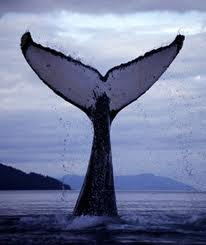Fluke

Ron Jolly of WTCM wondered why we didn’t hear of any Lake Michigan whale sightings in July. As he put it, “Question is, why the delay? Global warming? Tea partiers? Nestle's Ice Mountain bottling plant?”
I responded, “Perhaps it was just a fluke. [Pause for groans.]
Fluke comes from an Old Norse word meaning flat. It was used to name a flat fish, probably the flounder. It was also a parasitic worm, so called because it resembled a flounder. In addition, it was also the name of a variety of kidney potato.
A second fluke was defined by Admiral Smyth as one of “the broad triangular plates of iron on each arm of the anchor, inside the bills or extreme points, which, having entered the ground, hold the ship.” It was also the barbed head of a lance or arrow. From there, by analogy, it came to mean the two parts that constitute the large triangular tail of the whale.
A third fluke was a billiard term, a successful stroke made by accident or chance. Hence, fluke meaning a lucky stroke, an unexpected success, or a piece of good luck.
SIDEBAR: Lake Michigan whales
Available from McFarland & Co.: Word Parts Dictionary, 2nd edition
Check out Mike's program-based books here:
Arbutus Press
or at Amazon.com
Listen to Mike’s program in real time every Tuesday morning, 9:00 - 10:00 a.m. EST, by going to wtcmradio.com and clicking on Listen Now.
There is a collection of podcasts. Go to wtcmradio.com and click on Podcasts. Scroll down The Ron Jolly Show to find the Words to the Wise audio button.
Visit The Senior Corner at seniors.tcnet.org


Comments